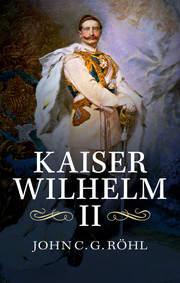Book contents
- Frontmatter
- Dedication
- Contents
- List of figures
- Acknowledgements
- Preface to the English edition
- Preface to the German edition
- Acknowledgements
- Overview: Wilhelm the Last, a German trauma
- Part I 1859–1888: The Tormented Prussian Prince
- Part II 1888–1909: The Anachronistic Autocrat
- 6 Divine right without end
- 7 Bismarck’s fall from power (1889–1890)
- 8 The establishment of the Kaiser’s personal monarchy (1890–1897)
- 9 The Chancellor as courtier: the corrupt Bülow system (1897–1909)
- Part III 1896–1908: The Egregious Expansionist
- Part IV 1906–1909: The Scandal-Ridden Sovereign
- Part V 1908–1914: The Bellicose Supreme War Lord
- Part VI 1914–1918: The Champion of God’s Germanic Cause
- Part VII 1918–1941: The Vengeful Exile
- Notes
- Index
8 - The establishment of the Kaiser’s personal monarchy (1890–1897)
Published online by Cambridge University Press: 05 September 2014
- Frontmatter
- Dedication
- Contents
- List of figures
- Acknowledgements
- Preface to the English edition
- Preface to the German edition
- Acknowledgements
- Overview: Wilhelm the Last, a German trauma
- Part I 1859–1888: The Tormented Prussian Prince
- Part II 1888–1909: The Anachronistic Autocrat
- 6 Divine right without end
- 7 Bismarck’s fall from power (1889–1890)
- 8 The establishment of the Kaiser’s personal monarchy (1890–1897)
- 9 The Chancellor as courtier: the corrupt Bülow system (1897–1909)
- Part III 1896–1908: The Egregious Expansionist
- Part IV 1906–1909: The Scandal-Ridden Sovereign
- Part V 1908–1914: The Bellicose Supreme War Lord
- Part VI 1914–1918: The Champion of God’s Germanic Cause
- Part VII 1918–1941: The Vengeful Exile
- Notes
- Index
Summary
Just why Wilhelm II hit upon General von Caprivi as Bismarck’s successor in the three highest offices – Reich Chancellor, Prussian minister-president and Prussian minister for foreign affairs – remains a mystery. The only clue we have is that Eulenburg visited the reclusive general, whom he had never met beforehand, at his regimental headquarters in Hanover on 6 March 1890. Even the Kaiser’s brother, Prince Heinrich, thought the news of the appoíntment had to be a mistake and commented that it was surely Waldersee who was to be Chancellor, while Caprivi would be chief of the General Staff. The choice of this thoroughly decent, unsophisticated, non-political general gave the by no means mistaken impression that the Kaiser wanted to be his own Reich Chancellor. Caprivi had no natural supporter base at court or among the landed aristocracy, let alone in the newly elected Reichstag, where he lacked any kind of backing. Moreover, he had no experience of foreign affairs; a German diplomat spoke of his ‘almost crass ignorance’ in this field. Caprivi’s self-admitted incompetence in foreign policy became an even greater drawback when the Kaiser, after failing to persuade Herbert Bismarck to stay on, appointed as head of the Foreign Office a man who also lacked any diplomatic experience, namely Holstein’s protégé Adolf Freiherr Marschall von Bieberstein, a lawyer who till then had been the representative of the south-west German grand duchy of Baden in Berlin. It is scarcely possible to imagine a more serious loss of diplomatic expertise than that constituted by the replacement of the two Bismarcks by Caprivi and Marschall.
- Type
- Chapter
- Information
- Kaiser Wilhelm IIA Concise Life, pp. 53 - 62Publisher: Cambridge University PressPrint publication year: 2014



